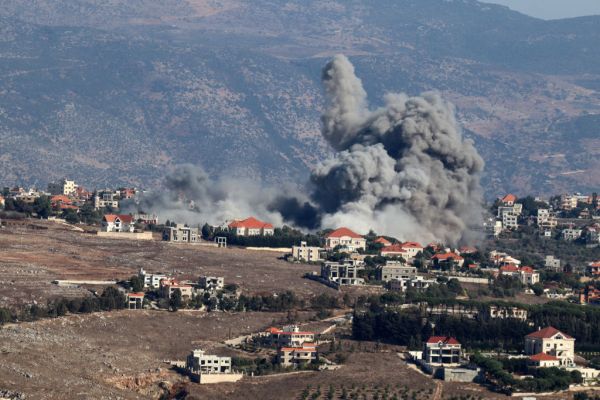Happy Monday! And welcome to the most wonderful time of the year: Fat Bear Week. (Editor’s Note: I nominate Andrew Billings.)
The annual contest congratulates the brown bears of Katmai National Park in Alaska on a summer of bulking up before they go into hibernation for the winter—and pits them against each other in a battle to crown the chonkiest bear. (Editor’s Note: … Oh. Whoops.)
Quick Hits: Today’s Top Stories
- An Israel Defense Forces (IDF) airstrike in Beirut on Friday killed Hezbollah leader Hassan Nasrallah, the IDF and the Iran-backed, Lebanon-based terror group both confirmed on Saturday. U.S. officials claimed they had no prior warning about the massive strike—likely carried out with U.S.-supplied 2,000-pound “bunker buster” bombs—which took place while Israeli Prime Minister Benjamin Netanyahu was in New York City as part of the United Nations General Assembly meeting. After days of sustained attacks by the IDF—including another strike over the weekend targeting Hezbollah official Nabil Kaouk—the terror group’s leadership is significantly degraded. Israeli forces continued airstrikes in the region over the weekend, striking a port in Yemen on Sunday controlled by Iran-backed Houthi rebels, as well as bombing additional targets in southern Lebanon.
- U.S. Central Command (CENTCOM) announced on Sunday that the U.S. military had conducted two strikes in Syria this month, targeting senior leaders of an al-Qaeda affiliate and the Islamic State (ISIS). Combined, CENTCOM said the two strikes—on September 16 and September 24—killed 37 terrorists and claimed there had been no civilians harmed.
- More than 90 people have died as a result of Hurricane Helene, which made landfall just east of Tallahassee, Florida, late Thursday night as a Category 4 storm. The death toll is expected to rise after the storm cut a path of destruction through the southeast over the weekend, bringing heavy rain that caused flooding and mudslides—particularly in North Carolina and southern Appalachia—as well as heavy winds that felled trees and knocked out power for some two million people. President Joe Biden on Saturday approved major disaster declarations for Florida and North Carolina, as well as emergency declarations for North Carolina, Tennessee, South Carolina, Georgia, Virginia, and Alabama. Biden said Sunday he plans to visit some of the impacted areas this week, provided it doesn’t interfere with recovery work.
- The U.S. armed forces carried out training exercises with four other Pacific nations—the Philippines, Australia, Japan, and New Zealand—in the South China Sea on Saturday, at the same time as China undertook drills elsewhere in the South China Sea. China holds an illegal claim on much of the waterway and has recently behaved aggressively toward Filipino vessels as part of a dispute over coral islands.
- Austria’s far-right Freedom Party won its first-ever general election victory Sunday, securing more than 29 percent of the vote, ahead of the ruling conservative party. The Freedom Party—which favors ending sanctions against Russia, is skeptical of the European Union, and takes a hardline on immigration—may not be able to form a government after leaders of the other parties said they would refuse to join a coalition with controversial Freedom Party leader, Herbert Kickl.
- Former President Donald Trump met on Friday with Ukrainian President Volodymyr Zelensky, who later said that he had “very direct information” from the former president “that he will be on our side, that he will support Ukraine.” Over the weekend, Russian attacks in Kharkiv reportedly killed four people, Russian airstrikes on a hospital in the northeastern Ukrainian town of Sumy killed nine people and injured a dozen more, and more than a dozen were wounded in strikes on the city of Zaporizhzhia.
- Singer, songwriter, and actor Kris Kristofferson died on Saturday at the age of 88. The Oxford-educated country music star penned songs for Johnny Cash, Janis Joplin, Ray Price, and others throughout his long career, which included starring in A Star is Born opposite Barbra Streisand.
- British actress Maggie Smith died Friday at the age of 89. Though best known in recent years for her roles in the TV show Downton Abbey and the Harry Potter film series, Smith was prolific on the stage. She also won Oscars for 1969’s The Prime of Miss Jean Brodie and 1978’s California Suite.
‘We Are Winning’

When Israeli Prime Minister Benjamin Netanyahu declared during his fiery address to the United Nations General Assembly on Friday that the U.N. was a “swamp of antisemitic bile,” dozens of diplomats in attendance had already walked out in protest.
But the rhetorical explosions in New York City were merely a distraction—perhaps, it appears, by design—from a massive strike that rocked Beirut on Friday.
After more than a week of Israeli attacks on the senior leadership of Hezbollah—the Iran-backed, Lebanon-based terror group—Friday’s strike was most remarkable for its scale. At least four buildings were flattened in a cloud of red dust, and the total number of casualties, including civilians, has yet to be confirmed. Among the dead, however, was Hassan Nasrallah, the Secretary General of Hezbollah and one of Israel’s most notorious enemies.
Nasrallah’s death, confirmed by Hezbollah, was a massive intelligence and military victory for Israel, which only recently set its sights on its enemy to the north who has forced tens of thousands of Israelis from their homes in the north of Israel. With effectively all of Hezbollah’s senior leadership now eliminated, it remains to be seen whether Israel will deem a ground invasion of southern Lebanon necessary in the coming days.
Nasrallah’s body was found among the cratered ruins left by Israel’s strike and identified by Hezbollah personnel. According to expert analysis of video released by the IDF and of the craters, it is extremely likely that the bombs used were U.S.-made 2,000-pound “bunker busters,” relied on for penetrating underground fortifications. Shipments of these bombs to Israel were “paused” this summer by the Biden administration, over fears that they would be used in densely populated civilian areas—as they were here.
In rebel-held parts of Syria—where Hezbollah was allied with the dictator Bashar al-Assad—people celebrated Nasrallah’s death in the street. In Israel, a song from the 2006 Lebanon war about killing the Hezbollah leader made a comeback in bars and clubs.
But with the joy came also a heavy measure of uncertainty about what comes next in the burgeoning “Third Lebanon War.” “With Nasrallah’s death, both the future of Hezbollah’s war against Israel and its position within its base in Lebanon are now in flux,” Charlotte writes in a piece on the site today:
At the time of his assassination, the 64-year-old Shiite cleric had led the Iranian-backed organization for more than three decades, overseeing its growth from a fringe extremist faction into a well-trained terrorist army with an arsenal of between 150,000 to 200,000 missiles, rockets, and drones. Under Nasrallah’s reign, Hezbollah carried out a series of lethal terrorist attacks and fought in various wars in the Middle East and beyond, often on behalf of the Iranian regime. His death marks a major blow for Tehran, which views Hezbollah as its best insurance policy against a direct attack by Israel and the crown jewel in its network of regional proxies.
The killing of Nasrallah—which in itself would have sent a shock wave throughout the Middle East—was the culmination of a week of aggressive Israeli strikes, and touched off a weekend of Israeli military activity targeting Iranian proxies across the region.
The weekend’s far-reaching attacks moved beyond the immediate theater of operations in southern Lebanon. The IDF claimed that it conducted 120 strikes throughout Lebanon on Sunday alone, targeting Hezbollah fortifications, command centers, and munitions dumps. And after Houthi militants in Yemen launched ballistic missiles at Israel on Friday and Saturday, Israeli planes struck a port and power plants in the country, killing four and wounding 29. Israel has also reportedly begun, or is at least about to commence, small-scale raids into southern Lebanon by commando units. Israeli sources maintain that the decision for a full-scale invasion of southern Lebanon has yet to be made.
Hezbollah’s response has largely consisted of rocket attacks, but nothing on a scale exceeding the shape of the conflict up to this point. The group is likely highly disorganized after Israel’s successes over the past several weeks, and may not currently have the organizational capacity for a coordinated response.
But the reasons behind a shift in Israel’s military focus to the north have long been clear. Hezbollah has been firing on northern Israel since October 8, displacing roughly 60,000 civilians. The Israeli government, caught off guard by the October 7 Hamas offensive, only made the return of civilians to northern Israel an official part of its war aims earlier this month.
The decision to increase the scope and scale of operations is Israel’s attempt to resolve an impossible state of affairs, according to Raphael Cohen, director of the RAND Corporation’s strategy and doctrine program and a colonel in the U.S. Army reserves. “Since October 7, Hezbollah has been one foot in, one foot out,” he told TMD. “The Israeli strategic calculus is basically to push Nasrallah to make a choice, either stop the rocket fire and go back to a pre-October 7 normality in northern Israel, or, alternatively, if it’s going to be a full-fledged war, then so be it.” Cohen spoke to TMD on Thursday, before Nasrallah was killed.
Israel has been publicly preparing for an invasion of Lebanon for weeks, including the transfer of troops from Gaza to northern Israel and staging drills along the northern border. “Hezbollah does not move north to restore normalcy, we will continue gradually and with increasing intensity to strike the terrorist group and its leaders until the population can be safe,” Roni Kaplan, an IDF spokesman, said Saturday. “A ground invasion is not ruled out, but it is not confirmed either.”
“Increasing intensity” has certainly been the theme of the last several weeks, as we’ve reported. Earlier this month, Israeli intelligence detonated bombs in the communications devices of thousands of Hezbollah personnel. And a daytime strike last week reportedly killed almost all of the senior leadership of Hezbollah’s elite Radwan Force.
Israel has, in recent days, illustrated what analysts of the Israeli military already knew: The IDF is better prepared for a major offensive against Hezbollah than it was against Hamas. “The Israelis have recognized that Hezbollah has been a threat for a long time, and have taken that seriously in ways that they were not nearly as attuned to” about Hamas, Cohen told TMD.
According to Cohen, an Israeli ground assault in southern Lebanon might be more limited than its attack on Gaza, which seeks to destroy Hamas as an effective military force. Israel would likely seek to force Hezbollah to withdraw north of the Litani River, in accordance with the U.N. Resolution 1701, passed after 2006’s Second Lebanon War. The resolution mandated that Hezbollah withdraw from the Israeli border and give the Lebanese military and U.N. peacekeepers exclusive rights to patrol southern Lebanon—though Hezbollah never respected it and neither the peacekeepers nor the Lebanese government ever enforced the demilitarized zone.
Hezbollah’s string of humiliations also embarrasses their sponsor, Iran. Iran’s Supreme Leader, Ayatollah Ali Khomeini, has vowed revenge for the assassination of Nasrallah, proclaiming that the terrorist leader’s death “will not go unanswered.” It remains to be seen whether the Islamic Republic will activate its broader network of proxy forces in the region to attack Israel or its own arsenal of long-range weapons, as it did in ineffective April strikes against Israel.
The U.S. response to the situation in the Middle East may also shape Iran’s. The Pentagon confirmed on Sunday that it would keep the USS Abraham Lincoln aircraft carrier strike group in the region, as well as a joint Navy-Marines amphibious task force, which includes thousands of Marines to help with the potential evacuation of civilians from Lebanon. In a phone call Saturday, U.S. Defense Secretary Lloyd Austin told Israeli Defense Minister Yoav Gallant that the U.S. continued to support Israel’s right to self-defense, was committed to deterring Iran and its proxies, and “remains postured to defend its forces in the region.”
However, the Biden administration is reportedly frustrated with Israel’s actions, with anonymous officials telling the New York Times that Israel’s recent attacks represent a pattern of defiance from an ally. White House officials were apparently not told in advance of the Nasrallah strike, which took place after Netanyahu bluntly rejected a joint U.S.-French proposal for a 21-day ceasefire between Israel and Hezbollah.
On Saturday morning, President Joe Biden said that he welcomed the death of Nasrallah but maintained his emphasis on a diplomatic solution. “Hassan Nasrallah and the terrorist group he led, Hezbollah, were responsible for killing hundreds of Americans over a four-decade reign of terror,” he said. “His death from an Israeli airstrike is a measure of justice for his many victims, including thousands of Americans, Israelis, and Lebanese civilians.” Hezbollah was behind a 1983 terror attack on the U.S. Marine Corps Barracks in Beirut that killed more than 240 U.S. service members.
Biden didn’t give up on the hope, perhaps in vain, of a ceasefire: “Ultimately, our aim is to de-escalate the ongoing conflicts in both Gaza and Lebanon through diplomatic means,” he said.
But, one of the dictums of military strategy is that two sides are usually only willing to come to the negotiating table once it seems like military means will not achieve their goals. It does not seem like Israel thinks that’s yet true. As Netanyahu said during Friday’s speech at the U.N., “We are winning.”
Worth Your Time
- There’s a battle brewing inside BRICS—a group of rising, non-Western countries. “Some of its members, chief among them China and Russia, want to position the grouping against the West and the global order crafted by the United States,” Alexander Gabuev and Oliver Stuenkel explain for Foreign Affairs. “The addition of Iran, an inveterate adversary of the United States, only deepens the sense that the group is now lining up on one side of a larger geopolitical battle. Other members, notably Brazil and India, do not share this ambition. Instead, they want to use BRICS to democratize and encourage the reform of the existing order, helping guide the world from the fading unipolarity of the post–Cold War era to a more genuine multipolarity in which countries can steer between U.S.-led and Chinese-led blocs. This battle between anti-Western states and nonaligned ones will shape the future of BRICS—with important consequences for the global order itself.”
- DNA testing company 23andMe may not be long for this world, with uncertain results for all the genetic data it now owns, Kristen V. Brown reported for The Atlantic. “Its stock is on the verge of being delisted,” she wrote. “It shut down its in-house drug-development unit last month, only the latest in several rounds of layoffs. Last week, the entire board of directors quit, save for Anne Wojcicki, a co-founder and the company’s CEO. Amid this downward spiral, Wojcicki has said she’ll consider selling 23andMe—which means the DNA of 23andMe’s 15 million customers would be up for sale, too. … DNA might contain health information, but unlike a doctor’s office, 23andMe is not bound by the health-privacy law HIPAA. And the company’s privacy policies make clear that in the event of a merger or an acquisition, customer information is a salable asset. … For nearly two decades, the company had an incentive to keep its customers’ data private: 23andMe is a consumer-facing business, and to sell kits, it also needed to win trust. Whoever buys the company’s data may not operate under the same constraints.”
Presented Without Comment
Former President Donald Trump, on Truth Social:
It has been determined that Google has illegally used a system of only revealing and displaying bad stories about Donald J. Trump, some made up for this purpose while, at the same time, only revealing good stories about Comrade Kamala Harris. This is an ILLEGAL ACTIVITY, and hopefully the Justice Department will criminally prosecute them for this blatant Interference of Elections. If not, and subject to the Laws of our Country, I will request their prosecution, at the maximum levels, when I win the Election, and become President of the United States!
In the Zeitgeist
The late Dame Maggie Smith seemed to resent the fame she garnered from her portrayal of the Dowager Countess of Grantham on the hit TV show Downton Abbey. “It’s freedom,” she said when the show ended. But even she had to admit that her own barbed wit made her a good fit to play “spiky elderly ladies.” And Violet Crawley was the spikiest of them all:
Toeing the Company Line
- Dispatch Politics’ Charles Hilu answered readers’ questions in September’s Monthly Mailbag. To learn about Charles’ personal connection to the Salem Witch Trials, his thoughts on the best Lebanese food, and the most challenging role of his theater career, be sure to click here.
- In the newsletters: The Dispatch Politics crew dug into new data about Americans’ faith in elections, Jonah argued governing shouldn’t be an exercise in “experimentation,” Nick tried to explain (🔒) why Trumpworld is backing New York City Mayor Eric Adams, Chris bemoaned the proliferation of economic pandering this election cycle, and for Dispatch Faith, Jen Pollock Michel explored what is required of a Christian citizen.
- On the podcasts: Jonah caps off a big week for The Remnant by ruminating on the “presidential mandate” and why it’s meaningless, and Jamie is joined on The Dispatch Podcast by David Rubenstein to discuss presidential legacies.
- On the site over the weekend: Luis explored what Matt Walsh’s new film, Am I Racist?, misses about race in America, and Mark Tooley chronicled how the new Global Methodist Church came to be.
- On the site today: Charlotte looks at what Hassan Nasrallah’s death might mean for the future of Hezbollah and Melissa Kearney pens this week’s Monday Essay about why we shouldn’t dismiss concerns about a falling birth rate.
Let Us Know
Do you expect Israel to invade southern Lebanon?











Please note that we at The Dispatch hold ourselves, our work, and our commenters to a higher standard than other places on the internet. We welcome comments that foster genuine debate or discussion—including comments critical of us or our work—but responses that include ad hominem attacks on fellow Dispatch members or are intended to stoke fear and anger may be moderated.
With your membership, you only have the ability to comment on The Morning Dispatch articles. Consider upgrading to join the conversation everywhere.